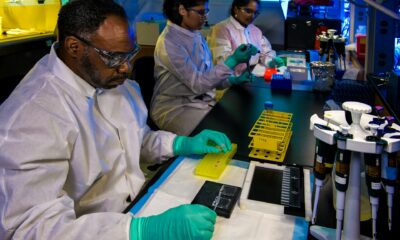Biotech
Roche, Phoenix, and Boehringer Into the Largest Family Groups of Pharma Companies
In total, the world’s five hundred largest family companies together generate $8.02 trillion and employ 24.5 million people worldwide. These 500 companies are growing twice as fast as the world’s leading economies. Almost half of the companies, 47%, are based in Europe. North America brings together 30% of the largest family businesses in the world.

Pharma companies owned by families are Twenty of the world’s five hundred largest family-owned companies are pharmaceutical, life sciences, and hospital companies.
The ranking among the players in the sector is headed by Roche, owned 50.1% by the Hoffman and Oeri family, according to the World Index of Family Businesses, prepared by EY. The Swiss pharmaceutical occupies the sixteenth position on the list.
Read more about the biotech sector and find out how many pharma companies are owned by family groups, with our companion app. The Born2Invest mobile app brings you the most important financial news of the day so you can stay on top of the market.
They are followed by Phoenix Pharmahandel, Boehringer Ingelheim, and Merck, at positions 41, 70, and 77, respectively
The giant from Mannheim (Germany) is 100% owned by Merckle. It is the largest pharmaceutical wholesaler in Germany and the second largest in Europe with around 153 distribution centers. Boehringer Ingelheim is controlled by the German Boehringer family. For its part, the Merck family holds 70.3% of Merck’s capital.
Companies from the health sector also appear in the ranking, such as Medline Industries, Universal Health Services, Dirk Rossmann, B. Braun, UCB, Cosmos Pharmaceuticals, the Spanish Grifols (which sneaks into position 312 in the ranking), Asklepios Kliniken, Sundrug, Menarini, and Ipsen, among others.
The general ranking is headed by Walmart, controlled by the Walton family, with 48.9% of the capital. In the second and third positions are the Berkshire Hathaway holding company, owned by the Buffet family, and the Cargill agro-industrial group, owned by the Cargill MacMillan family.
The only Spanish company in the health sector among the large family corporations is Grifols
In total, the world’s five hundred largest family companies together generate $8.02 trillion and employ 24.5 million people worldwide. These 500 companies are growing twice as fast as the world’s leading economies.
Almost half of the companies, 47%, are based in Europe. North America, for its part, brings together 30% of the largest family businesses in the world, while another 16% are located in Asia and Oceania.
In Spain specifically, in addition to Inditex and El Corte Inglés, there are Mercadona, Acciona, Corporación Gestamp, Ferrovial, Grifols, Grupo Catalana Occidente, Grupo Antolin-Irausa, Prosegur, and Técnicas Reunidas.
By sectors, the consumer goods sector, from fashion to food, is the one with the most companies, with 37%, both in the volume of companies and in billing. In second place is the industrial and mobility sector.
Despite being all companies in the hands of families, more than half of them, 55%, are led by an external executive. For their part, 23% of company boards of directors have a member of the family that owns them.
__
(Featured image by Ri_Ya via Pixabay)
DISCLAIMER: This article was written by a third party contributor and does not reflect the opinion of Born2Invest, its management, staff or its associates. Please review our disclaimer for more information.
This article may include forward-looking statements. These forward-looking statements generally are identified by the words “believe,” “project,” “estimate,” “become,” “plan,” “will,” and similar expressions. These forward-looking statements involve known and unknown risks as well as uncertainties, including those discussed in the following cautionary statements and elsewhere in this article and on this site. Although the Company may believe that its expectations are based on reasonable assumptions, the actual results that the Company may achieve may differ materially from any forward-looking statements, which reflect the opinions of the management of the Company only as of the date hereof. Additionally, please make sure to read these important disclosures.
First published in PlantaDoce, a third-party contributor translated and adapted the article from the original. In case of discrepancy, the original will prevail.
Although we made reasonable efforts to provide accurate translations, some parts may be incorrect. Born2Invest assumes no responsibility for errors, omissions or ambiguities in the translations provided on this website. Any person or entity relying on translated content does so at their own risk. Born2Invest is not responsible for losses caused by such reliance on the accuracy or reliability of translated information. If you wish to report an error or inaccuracy in the translation, we encourage you to contact us.

-

 Business1 week ago
Business1 week agoDow Jones Breaks 50,000 as Bull Market Surges Amid Caution and Volatility
-

 Impact Investing7 days ago
Impact Investing7 days agoEU Backs 90% Emissions Cut by 2040 and Delays ETS2 Rollout
-

 Crowdfunding2 weeks ago
Crowdfunding2 weeks agoNewcleo Raises $85 Million to Advance Fourth-Generation Nuclear Reactors
-

 Markets2 days ago
Markets2 days agoMarkets, Jobs, and Precious Metals Show Volatility Amid Uncertainty

























